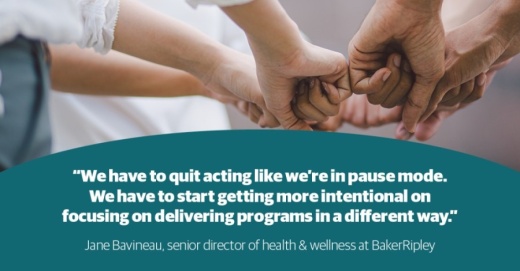When COVID-19 invaded the Houston area, nonprofit organization BakerRipley saw an immediate effect on the services it could provide.
The nonprofit focuses on assistance for senior citizens, disaster recovery, education, job placement and personal finances in the Greater Houston area, so when the pandemic began to change health and safety regulations in the area, all 11 of BakerRipley’s senior health and wellness centers closed down in March to protect older residents, including its Dementia Day Center near West University, said Jane Bavineu, the senior director of health and wellness at BakerRipley.
The centers served as many as 1,000 people a day.
“It was certainly a dramatic change,” she said.
When the pandemic hit in March, 52% of nonprofits surveyed locally said they were underresourced to meet the needs of the moment. Almost a third were unable to say how long they could persevere.
However, BakerRipley has remained optimistic as it moves forward, Bavineu said.
“We took some hits for sure,” Bavineu said. “I think we now know what we are largely dealing with.”
Providing basic needs
Despite a bleak financial prognosis for many nonprofits, not all have been negatively impacted by the pandemic.
Bellaire-based Second Servings, for example, has managed to thrive in the COVID-19 environment. The organization rescues and delivers excess prepared and perishable food from hotels, caterers, sports venues, distributors, and retailers to preapproved charitable meal sites.
“We were providing an essential service, so we were able to continue operating,” founder and CEO Barbara Bronstein said. “Also, we have gotten a lot of new support, and hopefully we will be able to sustain it.”
In fact, by the end of June, Second Servings had rescued over $12 million worth of food, as much as it had rescued in all of 2019. The nonprofit has also added 40 new food donors to its network, hired a new driver and bought a new van for food deliveries.
The increased demand for food services was anticipated, according to a March 22 Greater Houston Community Foundation survey that was designed to assess organizational capacity and needs.
In that survey, 85% of the respondents expected an increase in demand for their services. Up to that point, 80% of the 76 Houston-area nonprofits that responded said they had received inquiries for basic needs, while 66% had received inquiries about emergency financial assistance.
Meanwhile, BakerRipley has shifted over to delivering food because of the senior center closures. The nonprofit is delivering food to 1,600 seniors in Greater Houston.
The Society of St. Vincent de Paul Houston is also seeing increased demand for its food network and financial assistance.
Between March 17 and June 30, St. Vincent de Paul distributed 1.6 million pounds of food through various distribution events. The nonprofit also financially assisted over 8,000 individuals at a value of over $617,000.
General operational needs
About 75% of nonprofits in the Greater Houston area indicated funding to offset lost revenue in operations was one of their top three needs.
St. Vincent de Paul Houston is now facing a multifaceted issue as it grapples with what it projects will be a significant loss in donations while at the same time receiving 40% of its revenue from foundations and government-restricted funds to perform its normal services.
“In previous years that number was never that high because people were attending Mass, as well as donating during the Black Bag fundraising efforts,” said Jenni Granero, St. Vincent de Paul Houston’s director of development.
In 2019, for example, the bulk of funding to support general operations, including maintaining staffing levels, was from unrestricted individual donations, as well as through the Archdiocese. In its annual Black Bag Collection fundraiser, St. Vincent de Paul is normally able to raise about $600,000 each year.
In addition, having fewer people going to church in person has created a significant impact, Granero said.
Government funds received by nonprofits are restricted in how they can be used. According to guidance offered by nonprofit help organization Foundation Group, they cannot be used for other expenses, including paying for operational costs.
Unrestricted funds, such as those donated to St. Vincent de Paul, may be used for any legal purpose.
Even during tough financial times for a nonprofit, those restricted funds must remain untouched outside of their intended use unless given explicit permission by a donor.
“It seems logical that the money could be moved in an emergency,” the Foundation Group wrote. “But, the IRS is serious about restricted funds. Improper use can result in severe penalties, or even loss of exempt status. Boards can be sued by donors for misuse of such funds.”
Because of this, St. Vincent de Paul and nonprofit organization Neuhaus Education Center, which focuses on providing dyslexia training for potential therapists and elementary school teachers, are running lean.
“Right now we’re stretched to the max because we’re using fewer people,” Neuhaus President and CEO Tracy Weeden said.
Adjustments and long-term planning
Though nonprofits are attempting to weather the storm that is COVID-19, some will simply not make it.
It is estimated 22,420 nonprofits nationwide out of nearly 316,000 will shut down because of the pandemic, according to projections from research organization Candid, which conducted a study analyzing a slew of scenarios based on various levels of reduction in revenue and months of disruption caused by the pandemic.
Still, BakerRipley, Second Servings, Neuhaus and St. Vincent de Paul have kept their heads above water and continue offering services to their community by making adjustments.
In addition to delivering food to seniors, BakerRipley has tasked 40 volunteers across its network with calling seniors so they feel connected. It has also moved many of its classes and programs online.
“We have to quit acting like we’re in pause mode,” she said. “We have to start getting more intentional on focusing on delivering programs in a different way.”
One suggestion Bavineau made was to host regular virtual bingo nights for seniors to curb isolation.
“What worries me the most is the isolation and the loneliness that people are experiencing,” Bavineau said. “We need to look at this issue. It’s something seniors have experienced before, but now it’s in high relief.”
Neuhaus, meanwhile, has moved its staff to remote work, as has St. Vincent de Paul.
The nonprofit education center is exclusively using virtual classes for the districts it works with.
“We need to be able to perfect our ability to provide high-quality education regardless of district,” Weeden said. “We are going to come out of this better than we were before.”





